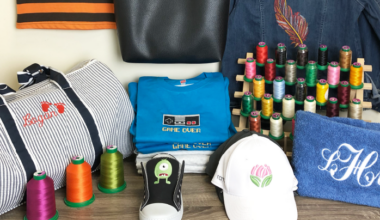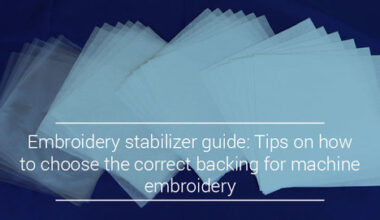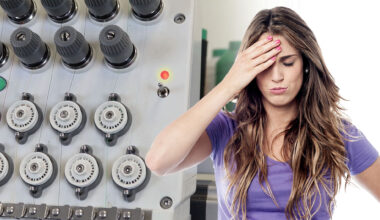
While embroidery needs multiple elements to bring it together, there’s one element that has to withstand the test of time: embroidery thread.
Selecting the best thread for machine embroidery is crucial because it can significantly affect how your designs turn out. The same way you would compare our embroidery machines when purchasing your first machine; choosing the best thread for machine embroidery will help differentiate your pieces from ones that could fall apart in a few months.
Here’s how to choose your embroidery threads wisely.
Most Popular Types of Thread for Machine Embroidery

Embroidery threads come in several types, each with its own special qualities. Knowing about these can help you pick the best thread for machine embroidery for your next project.
Let’s dive into some of the most popular types of threads used by embroiderers like you!
Rayon
Rayon thread is a favorite for many because it gives a super shiny finish that makes your embroidery really pop! It’s perfect for projects where you want a bit of gloss and glamour. Plus, rayon thread comes in loads of colors, so you can really let your creativity fly.
For decorative pieces that won’t see much wear and tear, rayon could be your go-to for that perfect shiny look.
But while rayon looks amazing, it does need a bit of extra care. It’s not the toughest or best thread for machine embroidery out there, and it can fade or bleed color if you wash it the wrong way. If you’re working on something that’ll need to handle lots of washes, you might want to consider another type.
Polyester
Polyester is super strong and holds its color really well, which makes it perfect for items that are going to be washed a lot or worn often, like uniforms or outdoor gear. It’s tough against fading and bleaching, so your embroidered designs will stay vibrant wash after wash.
Polyester thread also comes in many finishes, looking almost like rayon with its sheen or like cotton with a softer appearance. This versatility lets you match the thread to whatever look you’re going for.
Cotton

Cotton thread is all-natural and gives your embroidery a wonderfully soft finish. This makes it ideal for quilting or heirloom pieces that might be kept as keepsakes.
Cotton thread is also great because it comes in different weights, so you can choose a heavier or lighter thread depending on the fabric you’re embroidering.
Cotton has a matte finish, giving your work a classic, understated look. This can be really beautiful and the best thread for machine embroidery on projects where you want the texture of the stitch work to stand out more than a shiny sheen.
Silk
Silk thread is the touch of luxury in the embroidery thread family. It has a natural sheen and smoothness that other threads just can’t match, making it perfect for those really special projects where you want a bit of elegance and luxury. Despite its delicate look, silk is actually quite strong, which is great for high-end embroidery that needs to hold up over time.
However, silk threads can be a bit tricky to care for—they’re more susceptible to damage and wear, so they’re best saved for pieces that won’t undergo frequent handling or washing.
Specialty
Finally, we have specialty threads, which are like the fun cousins in the thread family! These include metallic, glow-in-the-dark, and variegated threads that change colors. These threads can add incredible effects and make your embroidery stand out in amazing ways.
Working with specialty threads can sometimes be challenging. They might break more easily or cause tension problems on your machine. It’s important to take it slow and adjust your machine settings accordingly.
Factors to Consider When Choosing Embroidery Thread
Choosing the right thread is not just about picking a color that matches your design. It’s about making sure your entire project turns out just the way you want it. Different threads can have a big impact on both the look and the durability of your embroidery, so it’s crucial to pick the right one based on what you’re making and how it will be used.
When selecting a thread, consider how the embroidery will be used, the type of fabric it will be on, and how often it will need to be washed. Here’s how you can make sure you’re choosing the best thread for machine embroidery and for your needs:
Fabric Type
The type of fabric you are embroidering on can greatly influence your choice of thread. For example, cotton fabric works well with almost any type of thread, but if you’re working with a stretchy material like polyester, you might want to use a polyester thread because it has more give and can stretch with the fabric.
For delicate fabrics, a finer thread like rayon or silk might be the best choice to avoid damaging the fabric. It’s a good idea to test the thread on a scrap piece of your fabric first to see how it behaves and looks. This can save you from any surprises in your final project!
Durability
If your embroidered item will be washed frequently, such as kids’ clothes or kitchen towels, choosing a durable thread like polyester is key. Polyester is strong and resists fading, so it can withstand frequent laundering without losing its color or breaking down.
On the other hand, if the item is more decorative and won’t see a lot of wear and tear, you might choose rayon for its shine and color vibrancy. Consider where and how the item will be used and choose a thread that matches those needs.
Color Fastness
Nobody wants the colors in their beautiful embroidery to run or fade after the first wash. That’s why color fastness is so important. Polyester threads are generally very colorfast, making them ideal for items that will be laundered often.
Before you start your project, you can test color fastness by washing a bit of the thread in hot water. If the color bleeds out, you might want to consider another thread or pre-wash your threads to remove any excess dye.
Working with Different Threads: Tips & Tricks For Your Machine

Getting the best results from your embroidery machine involves more than just picking the best embroidery thread for machine and loading the thread and fabric. Here are some key tips for working with different threads:
Tension Adjustment
Each type of thread has its own characteristics, which means you might need to adjust your machine’s tension settings. For example, thicker threads might require a looser tension, while finer threads might need tighter tension to prevent looping or puckering.
Always start with a test piece to adjust the tension before you start on your actual project. Watch for signs like too tight stitches pulling at the fabric or loose stitches forming loops.
Thread Storage and Handling
Proper thread storage and handling are key to maintaining the quality of your threads. Keep your threads away from direct sunlight to prevent fading, and avoid damp areas that can cause mold or degradation. Store them in a cool, dry place, ideally in a sealed container or drawer.
When working with specialty threads like metallics or variegated types, handle them gently to avoid kinks or frays that could affect your stitching. A little care goes a long way in keeping your threads in top shape for beautiful embroidery every time!
Troubleshooting Common Thread Issues
Embroidery can be a lot of fun, but sometimes you might run into a few hiccups with your threads. Here’s how you can solve some typical thread problems and keep your embroidery looking sharp:
Thread Breakage
Thread breaking can be super frustrating, especially if it happens a lot. The most common reasons for thread breakage include using the wrong type of needle, having the tension set too high, or using poor-quality thread.
To fix this, first, check your needle. Make sure it’s the right size for your thread and fabric, and that it’s not blunt or damaged. Adjusting your machine’s tension can also help—sometimes loosening it a bit is all you need. The best embroidery thread for machine embroidery is often a little more expensive, but made with more intentional and quality.
Thread Tangling
Tangling can cause a real mess on the back of your embroidery, but it’s often easy to fix. Tangling usually happens if the thread is not properly threaded through the machine or if the tension is off.
To prevent tangling, make sure your machine is threaded correctly—every loop and hook matters! Check your tension settings by doing a test run on a scrap of fabric. If the thread still tangles, it might be time to give your machine a little TLC with some maintenance.
Regularly cleaning and oiling your machine can also keep it running smoothly and prevent many threading issues.
Start Your Embroidery Business with Ricoma!
Thinking about turning your embroidery hobby into a business? We offer high-quality embroidery machines, like the SWIFT embroidery machine, that are perfect for both beginners and seasoned pros looking to expand their business!
From our Chroma digitizing software to our machines, everything is designed to be user-friendly and reliable, making them a great choice for anyone and everyone!
So what are you waiting for? Pop on over to Ricoma to start your embroidery business today!






